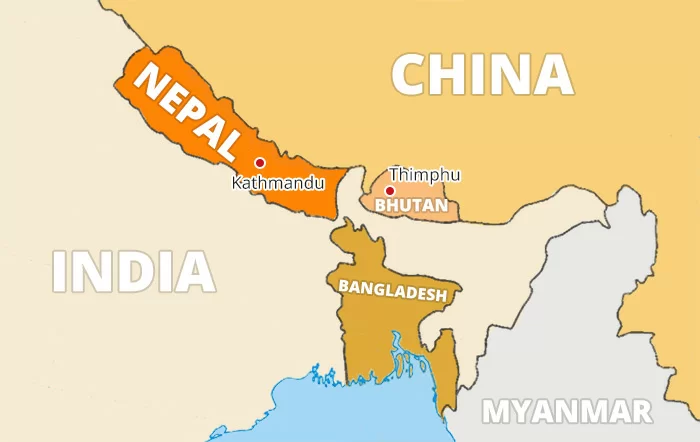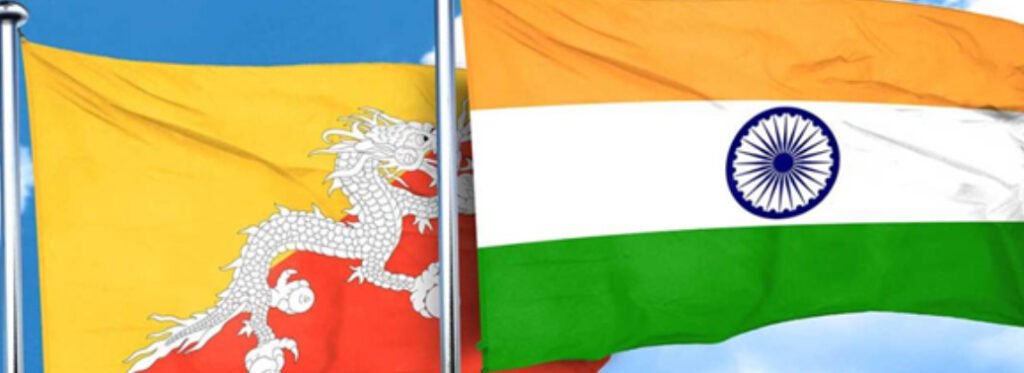Analyzing the relationship between India and Bhutan requires a multifaceted exploration that delves into historical, geopolitical, economic, cultural, and strategic dimensions. The ties between these two nations have been characterized by mutual respect, cooperation, and strategic partnership. This essay will comprehensively examine the evolution of the India-Bhutan relationship, exploring its historical context, diplomatic engagements, economic collaboration, cultural exchanges, and strategic imperatives.
Historical Background: The historical ties between India and Bhutan are deeply rooted in shared cultural, religious, and geopolitical factors. Bhutan, a small Himalayan kingdom nestled between India and China, has maintained close relations with its larger neighbor, India, for centuries. The relationship traces its origins to the 17th century when Zhabdrung Ngawang Namgyal, the Tibetan Buddhist lama, unified Bhutan and established a theocratic government. During this period, Bhutan sought to balance its relations between Tibet and the expanding British Indian Empire.
Colonial Era and Treaty of Sinchula: The British influence in the Indian subcontinent had a significant impact on Bhutanese affairs. In 1910, the Treaty of Punakha was signed between British India and Bhutan, which defined the border between the two nations. The Treaty of Sinchula later superseded this treaty in 1865, which further delineated the borders and established British influence in Bhutan’s external affairs. Although Bhutan maintained its autonomy, it relied on British India for protection against external threats.

Independent India and Diplomatic Relations: With India’s independence in 1947, the dynamics of the India-Bhutan relationship transformed. Bhutan recognized India’s sovereignty and established diplomatic ties with its neighbor. The Treaty of Friendship between India and Bhutan was signed in 1949, affirming mutual respect independence, and territorial integrity. Under this treaty, India assumed responsibility for Bhutan’s defense and foreign affairs, cementing a close strategic partnership between the two nations.
Economic Cooperation and Development Assistance: India has been a key partner in Bhutan’s economic development. Through various bilateral agreements and initiatives, India has provided substantial financial assistance, technical expertise, and infrastructure development projects to Bhutan. The hydropower sector has been a cornerstone of economic cooperation, with India assisting Bhutan in harnessing its hydroelectric potential and exporting surplus electricity to India. Additionally, India has supported Bhutan in sectors such as education, healthcare, agriculture, and tourism, contributing to Bhutan’s socio-economic progress.
Cultural Exchanges and People-to-People Contacts: Cultural ties between India and Bhutan are deeply ingrained due to shared religious, linguistic, and ethnic affinities. Buddhism plays a central role in Bhutanese culture, and the country shares a spiritual connection with regions in India such as Sikkim, West Bengal, and Arunachal Pradesh, where Tibetan Buddhist traditions thrive. Cultural exchanges, including festivals, religious pilgrimages, and educational programs, foster a sense of camaraderie and understanding between the people of India and Bhutan. Moreover, the open border policy allows for seamless travel and interaction, facilitating greater people-to-people contacts.
Strategic Imperatives and Security Cooperation: The strategic significance of Bhutan to India cannot be overstated, given its location as a buffer state between India and China. India’s security interests are closely intertwined with Bhutan’s stability and territorial integrity. The Doklam standoff in 2017 highlighted the strategic concerns shared by India and Bhutan regarding Chinese encroachments in the region. India’s swift response to the standoff reaffirmed its commitment to Bhutan’s security and sovereignty. Military cooperation between India and Bhutan, including training, joint exercises, and intelligence sharing, further strengthens their strategic partnership.

Challenges and Opportunities: Despite the strong bilateral ties, the India-Bhutan relationship faces certain challenges and opportunities. Economic dependence on India, coupled with concerns over environmental sustainability and debt management in the hydropower sector, poses challenges to Bhutan’s long-term development. Moreover, Bhutan’s growing engagement with other regional and global actors, including China, adds complexity to its foreign policy calculus. However, these challenges also present opportunities for diversifying Bhutan’s economy, enhancing connectivity, and leveraging its geostrategic position for mutual benefit.
Conclusion: The India-Bhutan relationship is characterized by shared history, strategic convergence, and deep mutual respect. Over the years, the two nations have forged a robust partnership encompassing diplomatic, economic, cultural, and security cooperation. Despite facing various challenges, the relationship continues to evolve, driven by a common vision of prosperity, stability, and mutual development. As India and Bhutan navigate the complexities of regional geopolitics and global dynamics, their enduring friendship remains a cornerstone of peace and prosperity in the Himalayan region.
